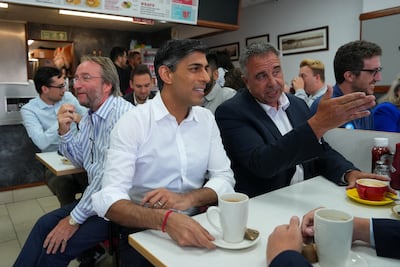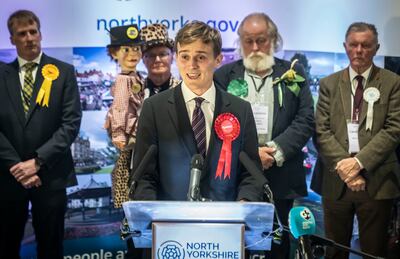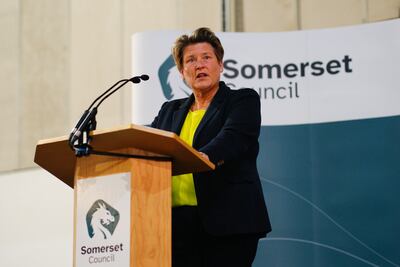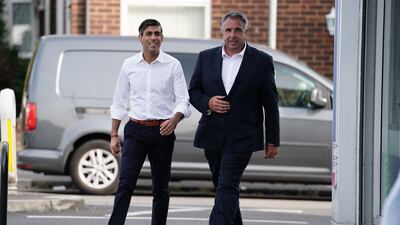Rishi Sunak has said the Tories’ victory in Boris Johnson’s old seat shows the next general election is “not a done deal”.
The UK Prime Minister was speaking during a victory lap of the Uxbridge and South Ruislip constituency in west London alongside Steve Tuckwell, who was elected as the new Conservative MP.
Three testy by-elections held on Thursday resulted in Mr Sunak’s party losing two strategic parliamentary seats, but it managed to cling on to Mr Johnson’s old constituency.
As the Tories continue to trail opposition party Labour in the polls, the Prime Minister used his success in Uxbridge to suggest that not all hope is lost for his party in the next nationwide vote.
“Westminster’s been acting like the next election is a done deal,” Mr Sunak said during a visit to a cafe on Friday morning. “The Labour Party has been acting like it’s a done deal.
“The people of Uxbridge just told all of them that it’s not.”

The next general election is expected to take place next year and Thursday was one of the last electoral tests before the nationwide vote.
The Conservatives lost their 19,000-vote majority in the south-western English seat of Somerton and Frome and their 20,000 majority in the northern seat of Selby and Ainsty.
Mr Tuckwell won the Uxbridge and South Ruislip seat with a majority of less than 500.
Mr Sunak said the next general election will be about matters “of substance”.
He said Mr Tuckwell's victory shows that “when people are confronted with a real choice, a choice on a matter of substance as they have here, they vote Conservative”.
“That’s what the general election is going to be about,” Mr Sunak said. “It’s going to be about actual issues that make a difference to people. And that’s what we deliver in the Conservative Party.”
Ulez blamed for Labour missing out
Mr Tuckwell, a local councillor, had distanced himself from Mr Johnson and instead focused on an anti-Ulez (ultra low emission zone) message. The car emission scheme introduced in 2019 by London’s Labour Mayor Sadiq Khan is set to be expanded to the capital’s outer boroughs at the end of August. It has proved hugely divisive as it will cost some drivers thousands of pounds a year just to use their car.
In a victory speech, Mr Tuckwell, a former postman, said: “Sadiq Khan has lost Labour this election and we know it was his damaging and costly Ulez policy that lost them this election.”
His predecessor in the seat, Mr Johnson, welcomed the “fantastic news” that the Tories had won.
“This shows the Conservatives can win in London and around the country,” Mr Johnson wrote on Twitter.
Winning Mr Johnson's former seat was a huge relief for Mr Sunak, who avoided becoming the first British leader to lose three by-elections on a single day in more than half a century.
However, the wiping out of his party's large majorities in the other constituencies will serve as hammer blows to his leadership.
Polling expert Sir John Curtice said Labour must ask why its hold on the electorate was “apparently so weak” that when a local issue such as Ulez in Uxbridge comes up, they “don’t perform as they should”.
Labour candidate Danny Beales had positioned himself against Ulez, saying it was "not the right time" to expand the scheme.
From August 29, drivers across every London borough will have to pay £12.50 ($16.30) a day if their vehicle is classed as high-polluting. The fee would mean a motorist might have to fork out up to £4,560 ($5969) annually to drive on the capital’s roads.
The changes to Ulez will affect up to 700,000 drivers, analysis indicates.
Angela Rayner, Labour's deputy leader, suggested the party did not win the seat because it did not “listen to the voters” about their Ulez concerns.
Speaking to BBC Breakfast, she said: “I think one of the things we have to reflect on today is not only the mood against the Tories, but also the decision in Uxbridge was related to Ulez. The Uxbridge result shows that when you don’t listen to the voters, you don’t win elections.”
Labour leader
Sir Keir Starmer, the Labour leader, echoed Ms Rayner, saying "Ulez was the reason we didn’t win" in Uxbridge, and urged Mr Khan to look again at his policy.
“We know that," he said. "We heard that on the doors. And we’ve all got to reflect on that, including the mayor.”
Asked if by "reflect" he meant the Ulez scheme should be scrapped, Mr Starmer replied: “We’ve got to look at the result. The mayor needs to reflect. And it’s too early to say what should happen next.”
Tory chairman Greg Hands has accused Mr Starmer of “flip-flopping” on Ulez.
“There’ll be real questions in Labour headquarters today about not gaining Uxbridge,” he told GB News.
“Londoners see that Labour is not good at running things and they see that Keir Starmer is changing his views all the time, depending on the audience that he has in front of him.
“In inner London, he’s pro-Ulez; put him in outer London, he’s suddenly expressing his doubts about Ulez.”
New baby of the House
The other results exposed the Conservatives' vulnerabilities on two fronts – the loss of a rural seat in the north of England where it performed strongly in the past, and one in the south-west, a traditional stronghold.
Labour won the constituency of Selby and Ainsty from the Conservatives by 4,000 votes after an ally of Mr Johnson resigned in solidarity with the former prime minister.

The swing from Conservative to Labour of 23.7 percentage points is the second-largest swing managed by Labour at a by-election since 1945.
It is not quite as large as the record 29.1 point swing achieved by Labour during the Dudley West by-election in December 1994.
Mr Starmer said the victory of Keir Mather, 25, in Selby and Ainsty demonstrates the “demand for change”. Mr Mather was not born when Tony Blair came to power and Labour ran the country for more than a decade.
Mr Starmer said Labour's success represented a "cry for change" from voters.
“We hear that cry for change away from the chaos, away from those rising bills, the crumbling public services – a cry for change and we will deliver," he said during a victory lap of Selby.
Mr Mather said the “historic moment for the Labour Party” in overturning a 20,137 majority was “a ringing endorsement of our plan”.
He told reporters the cost-of-living crisis was the No 1 issue on the doorstep throughout the campaign.
Asked about whether he could fully understand voters’ concerns given his young age, he said: “Well, I’m a taxpayer too; I feel the pressures like anyone else.”
He said it felt as if “we are on the precipice of a Labour government”.
In Somerton and Frome, the centrist Liberal Democrats managed to overturn a Conservative majority of 19,213 after a third member of parliament quit over allegations of sexual harassment and cocaine use.
Liberal Democrat candidate Sarah Dyke became the new MP for Somerton and Frome. The election was called after David Warburton quit.
Ms Dyke said she was “excited, exhilarated and most of all humbled” at the result.
“Its unbelievable and most of all I am delighted that finally Somerton and Frome have finally got a voice in the constituency but also in parliament and I can’t wait to get started,” she told reporters afterwards.
“I think the result here shows a very clear message now that the Liberal Democrats are back in the West Country.”
There was a 29 percentage point swing in the share of the vote from the Conservatives to the Liberal Democrats in Somerton and Frome.
The Liberal Democrats needed a 14.9 point swing to take the seat.

Mr Curtice, the polling expert, said based on Labour's performance, the party was unlikely to win an outright majority at the next election.
Steve Reed, a Labour front-bencher, blamed Ulez for the party's defeat in Uxbridge.
“I think the winning Conservative candidate just said it, didn’t he? He said that if it wasn’t for Ulez, he believes Labour would have won this by-election,” Mr Reed said.
“Clearly, it did resonate with a lot of people. They didn’t like the fact that Ulez was going to cost people more to drive around at a time when there’s a cost-of-living crisis going on. That’s exactly what Danny Beales was saying all the way through the campaign.”
Voters took to ballot boxes a day after Mr Sunak's popularity rating sank to its lowest point since he entered 10 Downing Street in October, according to a YouGov poll published on Wednesday.
Mr Sunak had prepared MPs for losses at a meeting of the 1922 Committee of Tory backbenchers on Wednesday evening, saying they faced a “tough battle” in what were once safe seats for his party.
He told them that governing parties rarely win by-elections but urged the MPs to unite in the face of any defeat as he pledged to “throw everything” at winning the next general election.
Mr Sunak said he was conscious of the battle he would face if voters rejected the Tory candidates, but urged MPs to unite ahead of a general election expected next year.
“When we come back in September we have a choice to make, all of us,” he told the meeting.
“Do we come together and throw everything at winning the next election or not? I’ve made my choice: I’m all in with you to win. I promise you we can do this but we can only do it together as one team.”
Tory backbencher Jonathan Gullis told reporters outside the meeting that the problem was “apathetic Conservative voters” rather than the public’s support for Sir Keir.
The Prime Minister could try to reset with a cabinet reshuffle after the contests. Defence Secretary Ben Wallace has already said he will exit the government at the next shake up of Mr Sunak's top team.
But No 10 said there were no plans for a reshuffle.


















